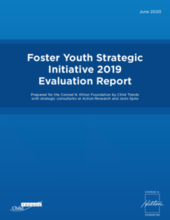Displaying 51 - 60 of 437
This article presents findings from the Co-Creating Evidence (CCE) project, a three-year evaluation of eight multi-service programs located in six Canadian jurisdictions.
The National Family Support Network has developed a unique 1-day in-person/virtual training for Program staff to maximize the great potential of Parent Advisory Committees.
This guidance from the American Academy of Pediatrics (AAP) is designed to support the continuation and improvement of efforts to ensure a stable home and caregiver for children in the child welfare system - which are important to nurturing their development and preventing trauma that can affect a child across the lifespan - so that all children and families may flourish.
This treatment-process research aims to (1) identify profiles of families participating in intensive family intervention programs, based on youth and family characteristics and (2) compare the intervention received by families with different clinical profiles.
This report summarizes some of the major accomplishments, challenges, and lessons learned from the Foster Youth Strategic Initiative, which aimed to ensure that older youth in foster care in Los Angeles County (LA) and New York City (NYC) become self-sufficient and thriving adults.
This brief article from Student Affairs Today highlights some of the lessons learned by student affairs professionals regarding foster care support programs at higher education institutions in the United States in light of the COVID-19 crisis.
This study utilizes a qualitative interview-based design to understand how the the interdisciplinary law office approach to parental representation in child welfare, used in the New York City Family Court, works in practice to impact the outcomes of families’ cases.
This paper chronicles the goals of the partnership and the planning and implementation of the Child Protection Training Academy, developed by the Illinois Department of Children and Family Services and the University of Illinois Springfield in the U.S.
A mixed method correlational exploratory pilot was conducted in Washington State to determine items within the home study assessment that could be used as indicators to identify baseline requirements of the assessment and suggest anticipated depth (expansion or reduction) within the required topic(s).
The current study uses two randomized control trials, one conducted with foster caregivers and one conducted with birth parents, to investigate the longitudinal effects of caregiver type (foster versus birth parent) and a home-visiting parenting intervention on emotion regulation among young children referred to Child Protective Services (CPS).

